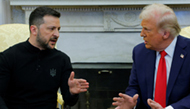Two Despots, in Sudan and Balkans, and a Wait for Justice

Radovan Karadzic is in custody, but despite massacres in Sudan, above, President Omar Hassan al-Bashir is still free.
By HELENE COOPERWASHINGTON - Let’s pretend, for a moment, that you are Sudan’s president, Omar Hassan al-Bashir, sitting in Khartoum and likely to face charges of genocide and crimes against humanity from the International Criminal Court for the last five years of bloodshed in Darfur.
You’re watching CNN International, and what comes on the screen but Radovan Karadzic, the notorious Bosnian Serb leader, apprehended after 13 years in hiding and about to be hauled to the United Nations-backed tribunal in The Hague on war-crimes charges.
Now what, Mr. Bashir?
A) Do you get really nervous at this peek into your future and decide to do what the international community has been telling you to do, sign a peace deal and let peacekeeping forces into Darfur?
B) Or do you figure that you have some options and decide that you might as well forget the peace deal and give the Janjaweed even freer rein to attack civilians and maybe even a few relief workers?
The dueling war-crimes cases of July - first Mr. Bashir is told that a prosecutor is seeking a warrant for his arrest , and then Mr. Karadzic gets arrested in Belgrade, Serbia - received two very distinct reactions from the international community. The reason may lie in the two pathways that Mr. Bashir could choose .
Just about everyone except a few very nationalistic Serbs appeared to cheer the arrest of Mr. Karadzic, who was indicted for the 1995 massacre in Srebrenica in which Bosnian Muslim men were slaughtered. But curiously, the request by the International Criminal Court’s prosecutor, Luis Moreno-Ocampo, for a warrant for Mr. Bashir’s arrest was greeted with ambivalence .
Gary Bass, a professor at Princeton in New Jersey who wrote a book on the politics of war-crimes tribunals, said human rights advocates worry that an indicted Mr. Bashir might think he has no option but to continue waging war; if he makes peace, he could still end up in The Hague. “From a human rights perspective, what’s more important? Mr. Bass asks. “Delivering justice for people who’ve been victimized, or preventing future victimization?
There are some within the human rights community who say that warcrimes indictments should be used only after a conflict is resolved to avoid extending the length of the conflict. Advocates of this view point to the case of Joseph Kony, head of the Lord’s Resistance Army, the guerrilla group that has fought the Ugandan government since 1987. During peace negotiations in 2005, the I.C.C. issued arrest warrants for Mr. Kony and his deputies, charging them with crimes against humanity that include murder, rape, sexual slavery and the enlisting of children as combatants.
Mr. Moreno-Ocampo met with some human rights advocates before issuing the warrants; the advocates said they urged him not to do it. Mr. Kony’s advisers said they would never surrender unless they were granted immunity from prosecution . A tenuous peace is holding right now in Uganda, but human rights advocates point out that Mr. Kony remains at large and fighting could flare up again .
International justice advocates say the don’t-indict-until-the-conflict-is-over argument is bogus. “What they miss is what an indictment does to change the internal debate,” said John Norris, executive director at Enough, a group that seeks to end genocide. “It’s a big thing when the international community stands up and says ‘this guy is reprehensible and we’re not going to do business with him.’
Mr. Norris worked for the American State Department during the Clinton administration. He said he was in Moscow for negotiations in 1999, while NATO forces were bombing Serbia, when news came that the Serbian president, Slobodan Milosevic, had been indicted for war crimes. Russian negotiators, Mr. Norris said, “saw this indictment as a disaster.
But, he argues, the indictment didn’t change Mr. Milosevic’s calculations. In fact, it was only a week later that Mr. Milosevic gave in to NATO’s demands and the war ended.
Why? For one thing, Mr. Milosevic had endured a fierce bombing campaign. For another, he believed - rightly - that he had other options. Indeed, it wasn’t until two years after he was indicted, in 2001 - after he had lost elections - that he was forced to surrender to Yugoslav security forces. He was then transferred to United Nations custody and eventually to The Hague, where he died two years ago, his trial incomplete.
Mr. Karadzic’s case is even more striking. After the Bosnian war ended in 1995, he lived as a fugitive for 13 years. It wasn’t until Serbia elected a new government more interested in joining Europe than in nationalism that the authorities arrested the Bosnian Serb leader.
Those cases suggest that one way warcrimes indictments are useful is not so much to obtain justice, but to help shape the postwar behavior of a country: its new leaders may need a way to re-engage the outside world.
Professor Bass of Princeton said that while he was not sure indictments were always advisable during a conflict, he did think they sometimes emboldened a country’s opposition, making a despot’s reign more tenuous. And, he added, there’s something to be said for justice.
“Does finding out the truth mean something? he asked.
스마터리빙
more [ 건강]
[ 건강]이제 혈관 건강도 챙기자!
[현대해운]우리 눈에 보이지 않기 때문에 혈관 건강을 챙기는 것은 결코 쉽지 않은데요. 여러분은 혈관 건강을 유지하기 위해 어떤 노력을 하시나요?
 [ 건강]
[ 건강]내 몸이 건강해지는 과일궁합
 [ 라이프]
[ 라이프]벌레야 물럿거라! 천연 해충제 만들기
 [ 건강]
[ 건강]혈압 낮추는데 좋은 식품
[현대해운]혈관 건강은 주로 노화가 진행되면서 지켜야 할 문제라고 인식되어 왔습니다. 최근 생활 패턴과 식생활의 변화로 혈관의 노화 진행이 빨라지고
사람·사람들
more많이 본 기사
- 쿠팡 김범석, 30~31일(한국시간) 연석청문회 또 불출석 의사… “일정 있어”
- ‘6·3 大戰’ 앞둔 대통령실 참모들 시선집중…10여명 출마 거론
- ‘통일교 자금관리’ 한학자 前비서실장 재소환…피의자 전환
- 여야, ‘통일교·종합 특검’ 정면충돌 예고…연말연시 대치정국
- 캐나다, 우크라에 18억달러대 추가 재정 지원키로
- 뉴욕에 3년만에 최대 폭설…항공기 수천편 결항·지연
- ‘파친코’ 이민진 작가 “맘다니 뉴욕시장, 긍정적 변화 기대”
- 태국-캄보디아, ‘101명 사망’ 교전 20일만에 휴전
- 황하나, 남편 사망→캄보디아서 남친과 출산..귀국 후 구속 ‘파란만장’
- NASA 신임 국장 “美, 트럼프 임기내 달에 다시 갈것”
- “트럼프, 29일 네타냐후 회담서 가자휴전 이행문제 제기키로”
- 젤렌스키 미국행… “레드라인 있지만 타협점 찾을 수 있어”
- 180일간 김건희만 판 특검 오늘 수사 종료…’V0’ 단죄 성과
- 이이경·조세호 다 떠나고..유재석 곁엔 결국 ‘무도’ 인연이었다
- 오윤아 “子, 학교 떨어져 잘못 키웠나..방치 했나 싶어 눈물”
- ‘AI 조작 번복’ 폭로자 vs ‘유재석 패싱’ 이이경..하차 잔혹사로 번진 사생활 논란 [2025 연말결산]
- 마지막 토요일도 도심 집회… “내란 … 1
- IS 확실했나…트럼프 ‘성탄절 나이지리아 폭격’ 갸우뚱
- ‘이강달’ 강태오, 로코 달인은 다르다.. “김세정도 눈빛 좋다고”
- “개인 선정은 SON이 유일?” 손흥민, 축구계 8대 기적 선정이 더 대단한 이유 “퀴라소 월드컵 진출보다 멋져”
- 뉴욕시 폭설에 항공기 수천편 취소·지연 사태
- 올해 美 기업 파산신청 증가… “관세·고물가·고금리 원인”
- “솔직히 자신은 없죠” 3루수 GG 송성문, 유격수도 아닌 외야라니... 생존 본능 발동할까
- “올해 최고 주목받은 테크 거물은 머스크 아닌 래리 엘리슨”
- “2025년 높이뛰기는 우상혁과 커의 무대” 세계육상연맹 조명... 우상혁도 “커와 계속 경쟁해야 해”
- 보수 야당 “의원직 사퇴하고 법심판 받아야”…김병기에 총공세
- 쿠팡 ‘정부 반박’ 영문성명 미묘한 표현차… ‘잘못된 비난’ 부각
- 러, 젤렌스키 미국행 앞 대규모 공습…우크라도 러에 드론 공격
- “SD서 최고 활약 김하성, 2024시즌만큼만 쳐줘도 ATL 3승 더한다” ESPN 극찬
- 국힘 “신천지로 통일교 특검 물타기 안돼”…與 “성역없이 규명”
1/5지식톡

-
 미 육군 사관학교 West Poin…
0
미 육군 사관학교 West Poin…
0https://youtu.be/SxD8cEhNV6Q연락처:wpkapca@gmail.comJohn Choi: 714-716-6414West Point 합격증을 받으셨나요?미 육군사관학교 West Point 학부모 모…
-
 ☝️해외에서도 가능한 한국어 선생님…
0
☝️해외에서도 가능한 한국어 선생님…
0이 영상 하나면 충분합니다!♥️상담신청문의♥️☝️ 문의 폭주로 '선착순 상담'만 진행합니다.☎️ : 02-6213-9094✨카카오톡ID : @GOODEDU77 (@골뱅이 꼭 붙여주셔야합니다…
-
 테슬라 자동차 시트커버 장착
0
테슬라 자동차 시트커버 장착
0테슬라 시트커버, 사놓고 아직 못 씌우셨죠?장착이 생각보다 쉽지 않습니다.20년 경력 전문가에게 맡기세요 — 깔끔하고 딱 맞게 장착해드립니다!장착비용:앞좌석: $40뒷좌석: $60앞·뒷좌석 …
-
 식당용 부탄가스
0
식당용 부탄가스
0식당용 부탄가스 홀세일 합니다 로스앤젤레스 다운타운 픽업 가능 안녕 하세요?강아지 & 고양이 모든 애완동물 / 반려동물 식품 & 모든 애완동물/반려동물 관련 제품들 전문적으로 홀세일/취급하는 회사 입니다 100% …
-
 ACSL 국제 컴퓨터 과학 대회, …
0
ACSL 국제 컴퓨터 과학 대회, …
0웹사이트 : www.eduspot.co.kr 카카오톡 상담하기 : https://pf.kakao.com/_BEQWxb블로그 : https://blog.naver.com/eduspotmain안녕하세요, 에듀스팟입니다…
케이타운 1번가
오늘의 1면
오피니언

새해 더 중요해지는 노동법 준수

연말연시, 안전하고 차분하게
 캐슬린 파커 워싱턴포스트 칼럼니스트
캐슬린 파커 워싱턴포스트 칼럼니스트 [캐슬린 파커 칼럼] 지미 라이의 마지막 희망
 유경재 나성북부교회 담임목사
유경재 나성북부교회 담임목사 [한국춘추] 미국의 힘
 전병두 서북미수필가협회 회원
전병두 서북미수필가협회 회원 [금요단상] 비자 발급
 박일근 / 한국일보 수석논설위원
박일근 / 한국일보 수석논설위원 [지평선] 스님의 주례사
 신상철 / 고려대 고고미술사학과 교수
신상철 / 고려대 고고미술사학과 교수 [미술 다시보기] 신의 모습을 닮고자 한 예술가
 스티브 강 전 한인민주당협회 회장
스티브 강 전 한인민주당협회 회장 [스티브 강 ‘인사이드 미국’] 2026 중간선거: 트럼프 지지율 하락이 말해주는 것
 김홍일 케이유니콘인베스트먼트 대표
김홍일 케이유니콘인베스트먼트 대표 [기고] 안정의 기준은 어떻게 제도가 되었나
1/3지사별 뉴스

물류거점창고에 불체자 8만명 수용 추진
도널드 트럼프 행정부가 이민자 구금·추방을 효율화하기 위해 전국 물류거점 창고에 8만명 규모의 수용시설 확보를 추진한다고 24일 워싱턴 포스트…
‘학자금 상환’ 안하면 임금압류

“온 세상에 희망·평화의 빛 스며들길”
가자지구와 우크라이나에서의 전쟁, 고립과 불평등으로 세상이 어지러운 가운데 워싱턴 지역 각급 한인교회와 성당들이 성탄절을 맞아 일제히 예배와 …
“연말은 스트레스·새해 결심은 없다”

“올해 최고 주목받은 테크 거물은 머스크 아닌 래리 엘리슨”
올해 미국에서 가장 주목받은 기술업계 거물은 일론 머스크 테슬라 최고경영자(CEO)가 아닌 래리 엘리슨 오라클 창업자·회장이라고 블룸버그 통신…
[새해부터 이렇게 달라진다] 최저임금 또 오르고… 유급 병가는 더 확대

오늘 하루 이 창 열지 않음 닫기 





















































.png)


댓글 안에 당신의 성숙함도 담아 주세요.
'오늘의 한마디'는 기사에 대하여 자신의 생각을 말하고 남의 생각을 들으며 서로 다양한 의견을 나누는 공간입니다. 그러나 간혹 불건전한 내용을 올리시는 분들이 계셔서 건전한 인터넷문화 정착을 위해 아래와 같은 운영원칙을 적용합니다.
자체 모니터링을 통해 아래에 해당하는 내용이 포함된 댓글이 발견되면 예고없이 삭제 조치를 하겠습니다.
불건전한 댓글을 올리거나, 이름에 비속어 및 상대방의 불쾌감을 주는 단어를 사용, 유명인 또는 특정 일반인을 사칭하는 경우 이용에 대한 차단 제재를 받을 수 있습니다. 차단될 경우, 일주일간 댓글을 달수 없게 됩니다.
명예훼손, 개인정보 유출, 욕설 등 법률에 위반되는 댓글은 관계 법령에 의거 민형사상 처벌을 받을 수 있으니 이용에 주의를 부탁드립니다.
Close
x